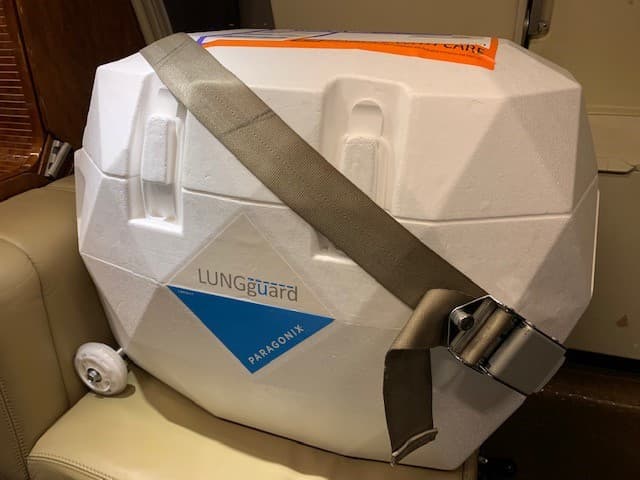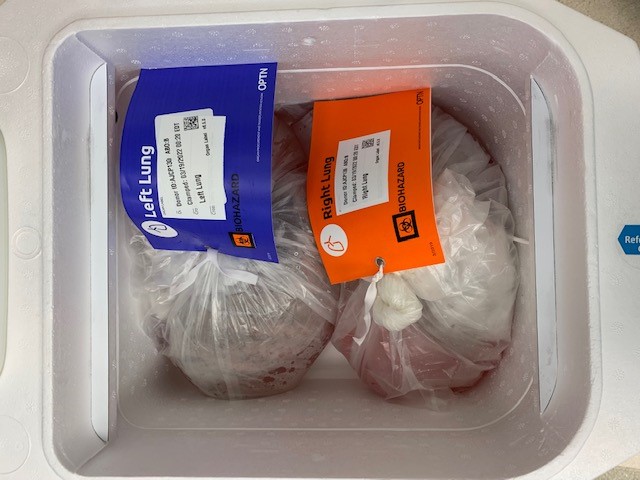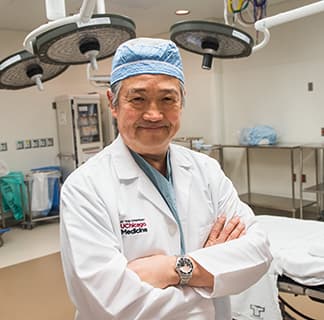UChicago Medicine using the newest, high-tech for transporting donor organs

It looks like a small cooler you’d wheel to a picnic, but the device used by the University of Chicago Medicine to transport donor lungs is one of the newest, most high-tech organ transportation systems on the market.
Record number of transplant surgeries in 2020 and 2021, both at UChicago Medicine and nationwide, led to a boom in new, state-of-the-art products that can safely transport donated organs to hospitals. UChicago Medicine is staying on top of all of this new technology, often being the first transplant program in the Chicago area to use the latest innovation.
Christopher T. Salerno, MD, Surgical Director of UChicago Medicine’s Heart Transplant and Mechanical Assist Device Program.
Ice can be unevenly distributed around the organ, making one area colder than another, which can create complications with rewarming and reperfusion. It can even cause freezer burn and injure the organ, Salerno said. Monitoring an organ’s temperature is challenging when it’s packed in ice, and melted ice must be drained and replaced.

UChicago Medicine’s new Paragonix LUNGguard eliminates the need for ice, using a new cooling technology that controls the in-cooler temperature to an optimum 4 to 8 degrees Celsius (39 to 46 degrees Fahrenheit).
“It puts your mind at great ease,” Bucio said. “If a transplant case is taking a little longer than normal ,or if we anticipate a complicated recipient surgery upfront that will require more time, the surgeon doesn’t have to be concerned about an organ sitting in a box on ice. These devices allow us to track temperature from the minute it goes into the cooler to the minute it comes out.”
Because of recent changes in the national organ allocation process, organ recovery teams are traveling farther and often out of state. Only about 10% of the organs that UChicago transplants come from Illinois; the other 90% require travel, often at significant distances.
For those long trips, UChicago Medicine might opt to use another leading-edge device, TransMedics OCS Lung (OCS stands for organ care system). In use since 2019, the system keeps lungs warm, oxygenated and pumps them with blood as they travel, keeping them viable longer than other preservation methods do. This extra travel time opens up donor options from across the country.
For now, UChicago Medicine will continue to use a mix of warm and cold perfusion systems, based on each individual patient’s needs. The systems include Paragonix LUNGguard, TransMedics OCS, Paragonix SherpaPak Cardiac Transportation and others.
“We’re in a period of very rapid growth,” said Rolf Barth, MD, Director of Liver, Kidney and Pancreas Transplantation at UChicago Medicine. “We think these devices will continue to offer patients a competitive advantage, as our program is doing things that other transplant programs around the Chicago area have not.”
These devices will continue to offer patients a competitive advantage, as our program is doing things that other transplant programs around the Chicago area have not.
UChicago Medicine is also investing in its Organ Perfusion Lab (OPL). The research laboratory – one of only a few in the country – investigates ways to assess donor organs before a transplant surgery, optimizing their quality and function.
That way, they’re in optimum condition before the surgery, leading to better outcomes for patients. As a result of UChicago Medicine’s development and investment in its OPL, the hospital is actively engaged in translational and clinical trials for transplant equipment and treatments.
Additional, groundbreaking procedures are on the transplant team’s radar in the future, including the use of animal and artificial hearts for transplants.
UChicago Medicine’s Surgical Director of the Lung Transplant Program is always looking for ways to be at the forefront and find new technologies that benefit our patients. We’re not afraid to try new things.
As the demand for transplants increases, these leading-edge tools will help UChicago Medicine remain one of top transplant hospitals in the country.
“The ultimate goal is expanding how many organs are available for transplant and transplanting more patients,” Barth said. “The University of Chicago Medicine has fully embraced this new era in organ transplantation, offering our patients increasing access to transplantable organs.”

World-Renowned Transplant Specialists
The University of Chicago Medicine is home to hundreds of medical experts.
Find a transplant specialist